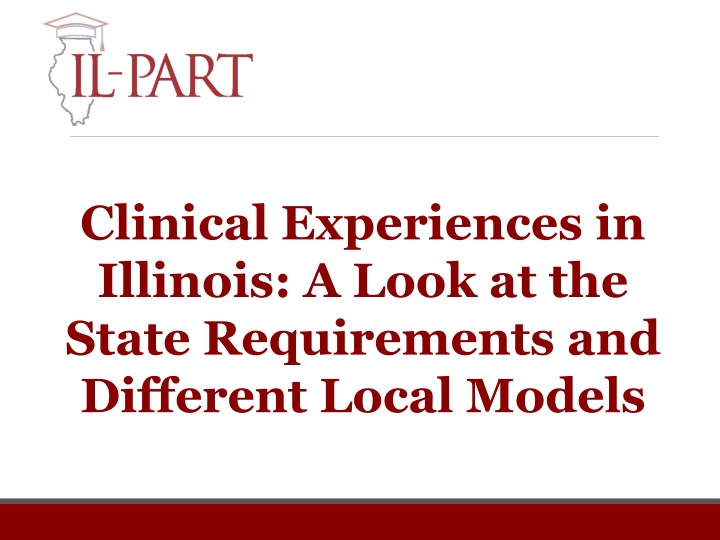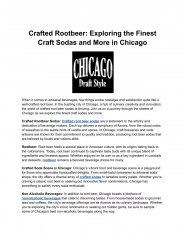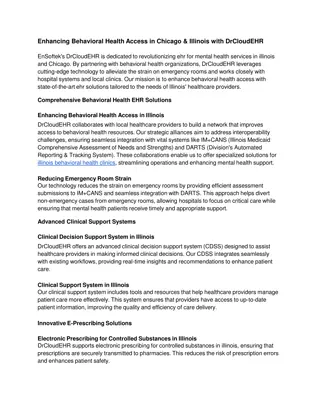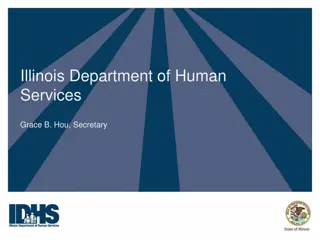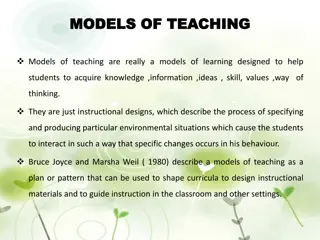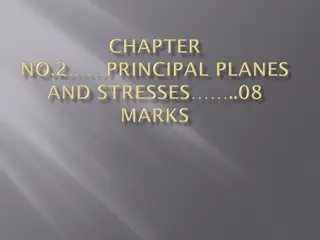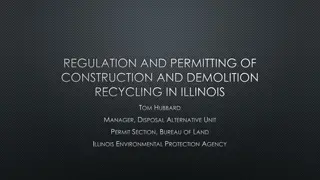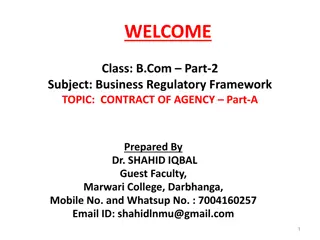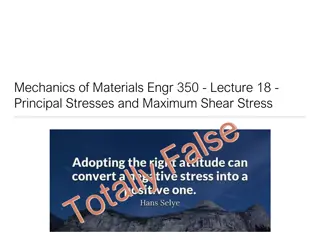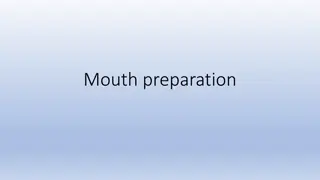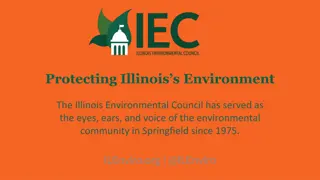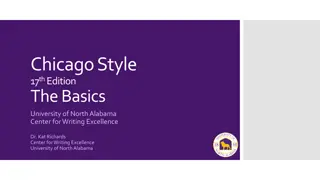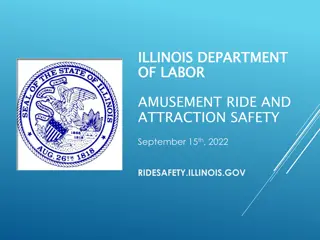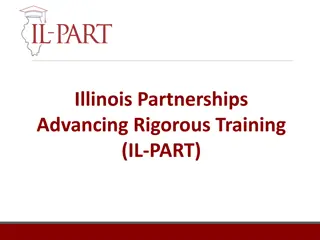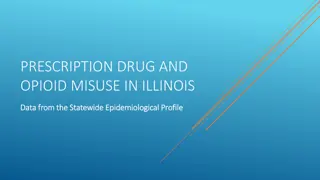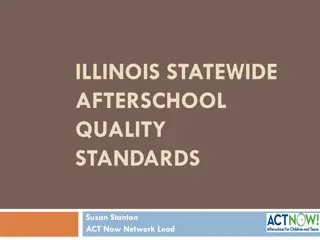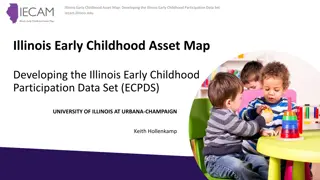Enhancing Principal Preparation in Illinois: Requirements, Models, and Chicago's Approach
Explore the state requirements and different local models for principal preparation in Illinois, including key elements of legislation, new internship requirements, and evidenced-based models in Chicago. Learn about the emphasis on performance-based internships, competency assessments, mentorship, and leadership development initiatives in the Chicago Public Schools district.
Download Presentation

Please find below an Image/Link to download the presentation.
The content on the website is provided AS IS for your information and personal use only. It may not be sold, licensed, or shared on other websites without obtaining consent from the author.If you encounter any issues during the download, it is possible that the publisher has removed the file from their server.
You are allowed to download the files provided on this website for personal or commercial use, subject to the condition that they are used lawfully. All files are the property of their respective owners.
The content on the website is provided AS IS for your information and personal use only. It may not be sold, licensed, or shared on other websites without obtaining consent from the author.
E N D
Presentation Transcript
Clinical Experiences in Illinois: A Look at the State Requirements and Different Local Models
State Requirements for Illinois Principal Preparation Internships
Key Elements of Principal Preparation Legislation Termination of Type 75 general administrative programs. Creation of a new Principal Endorsement attached to Professional Ed License. Requirement of a formal university/district partnership involved in the design, delivery and improvement of the program. Selective admissions criteria for applying to principal endorsement programs. PreK-12 licensure structure; required candidate experiences across grade span. Performance-based internship with required leadership experiences competency-based assessments with standardized scoring rubric. Collaborative supervision of candidates by a qualified and trained faculty supervisor and mentor principal. An 8-hour Principal Endorsement exam on Instructional Leadership administered by the Illinois State Board of Education.
Illinois New State Internship Requirements 1. Mandated year-long, performance-based internship designed to provide authentic leadership experiences intended to increase proficiency in areas shown to improve student learning. 2. Mandated competency-based assessments of candidate performance aligned to both the ISLLC Standards and Southern Regional Education Board s 13 Critical Success Factors and 36 Leadership Tasks. 3. Required 80% of internship activities be completed in a leadership capacity rather than an observational role. 4. A PreK-12 grade span focus that requires coursework and internship experiences across the grade levels including a focus on specific student subgroups (special education, ELL, early childhood, gifted). 5. Established minimum qualification and training requirements for mentor principals and faculty supervisors.
Illinois State Requirements Based on Two Evidenced-Based Models in Chicago DR. ALICIA HALLER, IL-PART CO-DIRECTOR FORMER ADMINISTRATOR, CHICAGO PUBLIC SCHOOLS
Illinois Demonstration Site: Chicago Public Schools CPS is the largest district in Illinois and the third largest in the U.S. CPS serves just under 400,000 students in 660 schools. CPS student demographics include: 91% minority, 87% low income, 18% limited English, 14% IEP, and 5% homeless. The district invests heavily in leadership development including: 1. Preparing a pipeline of effective school leaders through partnerships with selected principal preparation programs. 2. Rigorous screening of aspiring principals. 3. Principal mentoring (pre- and in-service). 4. Extensive professional development for school leaders.
Illinois Demonstration Site: Partners Original District Partners in Principal Preparation: New Leaders is a national non-profit with a mission to improve student outcomes by developing transformational school leaders through an intensive and authentic principal preparation program. UIC is a public university with an urban-focused principal preparation program designed around a five year EdD program. The initial partnerships between CPS and select principal preparation programs began in 2001. Partnerships began organically and have grown into a very formal structure: the Chicago Leadership Collaborative, launched in 2015.
CPS Partnerships with New Leaders- Chicago and the University of Illinois- Chicago: What They Do CPS officials and Preparation Partners work together to recruit and select roughly 30-40 high potential teacher leaders for participation in full time/full semester principal internships (annually). CPS pays the salary and benefits of the principal candidates to complete a full time/full year principal internship. The preparation programs provide coursework, supervision and coaching, and faculty from the program collaborate with CPS officials on the continuous improvement process. The district and partners collaboratively identify placement sites for the principal candidates to complete the internship. Dual mentoring and supervision is provided by the CPS host principal and faculty supervisor from the preparation program. Assessment of intern performance is completed jointly by the host principal and faculty supervisor. Faculty and host principals work with interns to assist them in securing positions upon completion of the internship.
CPS/New Leaders/UIC Outcomes Impact on the District: Between 2001-2015: New Leaders and UIC have supplied the district with over 270 principals, directly impacting over 130,000 students. UIC & NL led schools are outperforming CPS averages on numerous measures (from 2015 data): NWEA MAP Growth in Math (66% vs. 69%) and Reading (58% vs. 60%). Percent of Freshman on Track (59% vs. 84%). High School Graduation (68% vs. 70%) with the impact even greater in schools with 90% low income and 90% minority (69% vs. 87%).
CPS/New Leaders/UIC Strategy Partnerships between the district and preparation programs are focused on the following elements: Rigorous selection process focused on previous experience and performance. Relevant coursework that truly blends theory, empirical research, and practice. Authentic leadership experience in an intensive full time/full year internship. Comprehensive supervision and support throughout the program with coaching that spans from pre-service through the transition to novice principal.
Another Innovative Model: Full Time/Full Semester Internship DR. ERIKA HUNT, IL-PART CO-PROJECT DIRECTOR LED WALLACE FUNDED SCHOOL LEADERSHIP WORK IN ILLINOIS
Illinois State Legislation on Principal Preparation Schools Demonstrate Positive Change(s) via Working Conditions and Student Growth Gains (outcome) Partnership Advisory Committee University- District Partnerships Principal and APs Retained for at Least 2 Years (outcome) Principal Preparation Program(s) Principals and APs Placed in High-Need Schools (outcome) School-Based Learning Experiences (Internships) Selection of High- Potential Candidates Performance-Based Assessments Principal Certification Earned Pool of Highly Effective Principals and Assistant Principals (APs) for High- Need Schools in the State or Region Training for faculty supervisors Training for district mentor Network and development opportunities Data sharing and analysis Extensive teaching experience Knowledge & and Skills Portfolio of accomplishments (including evidence of student growth and leadership) Alignment of assessments with district principal evaluation system Assessments used to match potential principals with high- need schools IL IL- -PART PART Theory Theory of Action of Action
Full Time Internship Model IL-Part has piloted an intensive full time/full semester long internship model. The intensive model provides a longer duration of full-time, job embedded experiences than a traditional internship allows. The intensive model s approach to funding the substitute is a cost effective and replicable strategy. Project covers the substitute teacher s cost, versus the salary cost of the principal intern. Lessons learned on compliance with: How to utilize this model for successful succession planning to sustain the principal pipeline. Implications involving the new teacher evaluation system. Implications involving the Affordable Care Act. Identification and placement of quality substitute teachers.
IL-PART Satisfaction Survey Candidates completing full time internships expressed greater satisfaction with the program than do those completing traditional internships. Candidates serving full time internships reported a higher degree of supervision and a stronger belief that their programs prepared them to take on the challenge of school principal. Principal candidates, mentor principals, and university supervisors all acknowledged the benefits of the full time internship experience.
Mentor Principal Perspectives: Candidates Participation in Internship Experiences (n = 20) Their internship progress toward mastery of competency areas was monitored by the faculty supervisor and the assigned mentor principal. 30% 70% 5% They participated in other activities such as lunch or bus duty. 20% 30% 45% They took responsibility for leading, facilitating, and making decisions typical of a school principal (e.g., budget, staffing, etc.). 15% 50% 35% They developed a professional development plan for the school that was informed by various data. 45% 55% They observed and/or participated in the supervision of instructional staff. 10% 45% 45% They observed and/or participated in the hiring of teachers and staff at the internship school. 15% 30% 55% Not at all Minimum extent Moderate extent Great extent
Faculty Supervisor Perspective: Candidates Participation in Internship Experiences (n = 8) Their internship progress toward mastery of competency areas was monitored by the faculty supervisor and the assigned mentor principal. 12.5% 50% 37.5% They participated in other activities such as lunch or bus duty.* 14.3% 71.4% 14.3% They took responsibility for leading, facilitating, and making decisions typical of a school principal (e.g., budget, staffing, etc.). 12.5% 37.5% 25% 25% They developed a professional development plan for the school that was informed by various data. 37.5% 37.5% 25% They observed and/or participated in the supervision of instructional staff. 12.5% 12.5% 50% 25% They observed and/or participated in the hiring of teachers and staff at the internship school. 12.5% 62.5% 25% They were engaged in an early education program or classroom at their internship school. 12.5% 50% 25% 12.5% They served students at all grade levels (Grades PK-12). 25% 62.5% 12.5% They worked in school(s) serving students with various backgrounds (e.g., students with disabilities, ELLs, gifted students). 12.5% 62.5% 25% Not at all Minimum extent Moderate extent Great extent
Traditional Yearlong Candidate Internship Activities (n =17) Participating in a model evaluation of non-instructional staff. 35.3% 64.7% Participating in a model evaluation of instructional staff. 11.8% 88.2% Observing non-instructional staff 29.4% 70.6% Observing instructional staff 5.9% 94.1% Participating in the hiring of teachers and staff at this school. 5.9% 94.1% Communicating information about SIP to staff 5.9% 94.1% Determining progress towards SIP goals 17.6% 82.4% Being involved in the implementation of the SIP 5.9% 94.1% Developing a school improvement plan (SIP) 11.8% 88.2% Conducting data analysis using student data to inform the school improvement plan 11.8% 88.2% Conducting data analysis using student data to inform decision-making. 100% Aligning school's mission and vision with activities that improve teaching and learning 11.8% 88.2% Participating in different instructional support and guidance activities at this school (for example, use of data to improve instruction, designing curriculum, etc.) 100% Being engaged in early childhood programs or classrooms (for example, evaluating prekindergarten teachers in using curricula assessment). 23.5% 76.5% Serving students at all grade levels (Grades PK-12). 5.9% 94.1% Serving students with various backgrounds (for example, students with disabiliies, English language learners, or gifted students) 100% No Yes
Mentor Principal Matching FULL-TIME, FULL-SEMESTER RESPONDENTS (N = 5) TRADITIONAL YEARLONG CANDIDATES (N = 17) 24% 35% 41% Mentor principal preference 20% 80% My expressed preference for working with this mentor principal 18% 29% 53% 20% 80% 29% 35% 35% University input 20% 80% 41% 59% District input 20% 80% 35% 65% Availability of qualified mentor principals 20% 80% 35% 65% The location of the school (e.g., proximity of site to my home, proximity of site to the 20% 80% 18% 41% 35% 5.9% My areas for growth and development 20% 80% 6% 53% 41% My background or content area of expertise 20% 20% 60% 6% 47% 47% My interests 20% 80% 6% 29% 65% My current school type (e.g., elementary, middle, and high schools) 20% 80% Strongly disagree Disagree Agree Strongly agree Strongly disagree Disagree Agree Strongly agree
Internship Matching FULL-TIME, FULL-SEMESTER RESPONDENTS (N = 5) TRADITIONAL YEARLONG RESPONDENTS (N = 17) My expressed preference for working at this particular internship site 20% 80% 10% 50% 40% My ability to work or collaborate with other interns in the district 20% 80% 20% 70% 10% The type of environment in which I have the least experience 40% 60% 50% 40% 10% The location or area that I want to work in 20% 80% 10% 70% 20% The types of students I want to work with 20% 20% 60% 80% 20% The type of school that I eventually want to work at as a principal 20% 20% 60% 30% 50% 20% Strongly disagree Disagree Agree Strongly agree Strongly disagree Disagree Agree Strongly agree
Experience With Mentor Principal Supervision Full-Time, Full-Semester Candidate Perspectives (n = 5) Traditional Yearlong Candidate Perspectives (n = 17) 6% 20% 12% 35% 60% 20% 29% 80% 80% 24% 20% 50% 53% 35% 20% 20% 20% 10% I have been closely supervised and assisted by a knowledgeable school mentor principal. I have been closely supervised and assisted by a knowledgeable assistant principal. I have received regular (e.g., monthly) feedback from my mentor principal regarding my progress toward demonstrating the required competencies. 6% I have been closely supervised and assisted by a knowledgeable school mentor principal. I have been closely supervised and assisted by a knowledgeable assistant principal. I have received regular (e.g., monthly) feedback from my mentor principal regarding my progress toward demonstrating the required competencies. Not at all Minimum extent Moderate extent Great extent Not at all Minimum extent Moderate extent Great extent
Frequency of Observations TRADITIONAL YEARLONG CANDIDATES (N = 17) FULL-TIME, FULL-SEMESTER CANDIDATES (N = 5) Mentor principal 80% 20% 56% 44% Faculty supervisor 60% 40% 56% 44% Yes No Yes No
Number of Formal Mentor Principal Observations: Full- Time, Full Semester Candidates (n = 4) and Traditional Yearlong Candidates (n = 9) 100% 56% 22% 0% 0% 0% 1 or 2 times 3 or 4 times More than 4 times Full-Time, Full-Semester Candidates Traditional Yearlong Candidates
Logo image of Western Illinois University bell tower The New Internship Requirements from a University Perspective DR. CAROL WEBB, ASSOCIATE PROFESSOR, WESTERN ILLINOIS UNIVERSITY
Internship Requirements Internship Requirements The internship portion of the program shall enable the candidate to be exposed to and to participate in a variety of school leadership situations in settings that represent diverse economic and cultural conditions and involve interaction with various members of the school community IL Code Section 30.40(a) Engagement of the candidate in instructional activities that involve teachers at all grade levels (preschool through grade 12): In General Education Settings. In Special Education Settings. In Bilingual Education Settings. In Gifted Education Settings. In the observation of the hiring of teachers, other certified staff, and non-certificated staff. In the observation of supervision and evaluation of various staff. In the development of a professional development plan for teachers. In the engagement of the candidate in leadership opportunities. (No student supervision activities will be logged by a candidate.)
Internship Requirements Internship Requirements Assessment 1: The candidate conveys an understanding of how the school s vision and mission affect the work of the staff in enhancing student achievement. 1.1. Explain the purpose of the SIP and its relationship to the school s vision in a presentation to a group of stakeholders.... (SREB 6a, 6b, 12a). 1.2. Analyze, review and disaggregate data, including but not limited to, student work and state test results, and work with a faculty group/team to identify areas for improvement and interventions, with particular attention given to student subgroups and low performing students.(SREB 2c, 5a. 5b, 9a). 1.3. Work with faculty teams to create, implement, and formatively evaluate a school improvement action plan based on research based instructional practices. (SREB 1a, 7a, 13a). 1.4. Work with administration and faculty or faculty teams to gather and examine data and current best practices research to assess progress on the SIP and make recommendations for improvements and modifications to the SIP for the following year. (SREB 1b, 1c).
Internship Requirements Internship Requirements Assessment 2: The candidate demonstrates a comprehensive understanding of the process used for hiring, evaluation and professional development of staff to meet the learning needs of the students. 2.1. Participate in the hiring process including, at a minimum: creation of job description; creation of interview questions and assessment rubric; participation in interviews for the position; recommendation of the candidate to hire with rationale and data to support the selection; and preparation of letters of rejection for candidates who were not selected. 2.2. Conduct a full cycle of clinical observation, including a pre-observation conference, a classroom observation, and a post-observational conference for 4 different teachers. Write a summary that provides evidence utilizing actual notes, observations, discussion, forms, and student achievement data providing feedback to the teacher. Provide examples of interventions and supports needed for the non-tenured or struggling teacher. (SREB 8b) 2.3. In conjunction with stakeholders, lead in the development of a professional development plan for a school building that includes: (1) data analysis (reviewed in Focus Area 1.2); (2) multiple options for teacher development; and (3) a method for evaluating the professional development plan and the extent to which it will lead to school improvement. (SREB 8a, 8b, 8c)
Internship Requirements Internship Requirements Assessment 3: The candidate demonstrates the ability to understand and manage personnel, resources and systems on a school-wide basis to ensure adequacy and equity. 3.1. Investigate, define, and delineate the systems and factors for advocating, nurturing, and sustaining a culture of collaboration, trust, learning, high expectations, and a personalized and motivating learning environment for students with a focus on curriculum implementation that emphasizes effective research practices and strategies designed to close the achievement gap. (SREB 3a, 3b, 3c, 3d, 3e, 3f, 3g) 3.2. Review the school s budget and other resources with the internship principal. Detail how the resources are typically used, evaluated for adequacy, assess for effectiveness and efficiency. Provide recommendations for improvement. Address the impact of the budget on the following student subgroups: limited English proficiency, special education and economically disadvantaged. Present recommendations for improvement to a faculty group and solicit input in the budget developmental process. (SREB 11a) 3.3. Determine and analyze the different systems that exist within the school to fulfill the school s mission (i.e. instructional: curriculum, assessment, technology, class structure; and management: discipline plan; attendance; maintenance; transportation, etc.). Choose one instructional and one management system; create an assessment tool that will be used to rate the two systems. Finally, develop recommendations for improvement of aspects of the two systems that need improvement and report the findings to the internship principal.
Internship Requirements Internship Requirements Assessment 4: The candidate demonstrates a thorough understanding of the requirements for, and development of, individualized education programs. 8 Specific Tasks Assessment 5: Candidates demonstrate experiences and learnings that reflect common performance situations associated with success in the principalship. 18 Specific Tasks
Internship Requirements Internship Requirements University supervisors must Conduct 4 face-to-face meetings with mentors. Observe, evaluate and provide feedback 4 times a year to the intern. Host 3 seminars relating to student learning and school improvement. Complete, with the mentor, an intern assessment of the candidate s performance. Mentor principals must Complete an online tutorial on the principal internship requirements. Support interns in meeting the 3 SREB Competencies (13 Critical Success Factors & 36 associated activities). Hold a valid and current administrative certificate. Have 3 years of successful experience as a building principal. Have 2 years data (of last 5 years) showing student growth.
Traditional Model Traditional Model (Non (Non- -IL IL- -PART Schools) PART Schools) 1. Candidates complete internships in buildings in which they teach over a calendar year; often, because they have been leaders in their own schools, they continue to do what they ve done . 2. Tasks completed during prep time, summer, or school breaks can lack the leadership practice of working with groups. 3. Difficult to find time for planning, executing, and debriefing tasks with the mentor principal. 4. Difficult to schedule meaningful time in other districts having exceptionality in academics, income, grade levels, and diversity. 5. Lacks providing experience that broadens the candidate s perspective about education in a different setting. 6. Principal mentor has been the intern s supervising principal; intern may only experience one style of leadership.
Benefits of the Partnership Model Benefits of the Partnership Model Opportunity to shape partnership activities across the district. Opportunity to do internship at a different level within the district. Opportunity to experience a different leadership style; mentors apply and are selected to serve as mentors. Growth in knowledge of other grade levels unique challenges and opportunities. Because of the district support, interns have leadership opportunities throughout the year. Creates a focus on leadership for the district. University personnel participate in district professional development not just visit 4 times during the year. Partners assist in recruitment; screening from the district identifies best candidates.
Together, Were Better Together, We re Better P Partnership, not placement A Active involvement, not activity-driven R Rigorous, not restrained T Teams, not isolates N Natural, not negative E Enlightening, not enigmatic R Reflective, not redundant
What Does This Look Like at District Level? MS. MICHAELA FRAY, IL-PART DISTRICT UNIVERSITY PARTNERSHIP COORDINATOR QUINCY PUBLIC SCHOOLS
The Power of the Partnership Logo image of Western Illinois University bell tower Mutually Beneficial Partnerships
Training for All QPS Administrators Eight Professional Development Sessions for Administrators Building a New Structure for School Leadership Supervision of Principal Interns Administrative Academy Instructional Rounds Superintendent Rounds Training Network Instructional Rounds Crucial Conversations for School Leadership Implementing the QPS-WIU Internship Project Full-Day Principal Mentor Training by DuPage County ROE Blended Coaching Training- Dr. Gary Bloom IL-PART Symposium & Teacher Evaluation Professional Development
Resources for All QPS Administrators Professional Books Instructional Rounds in Education: A Network Approach to Improving Teaching & Learning by City, Elmore, Fiarman, and Teitel. School-Based Instructional Rounds: Improving Teaching & Learning Across Classrooms by Lee Teitel. Talk About Teaching: Leading Professional Conversations by Charlotte Danielson. Brain Science for Principals: What School Leaders Need to Know by Dr. Linda Lyman. Blended Coaching by Dr. Gary Bloom. Networking Opportunities WIU, ISU, & NCC Professors LUDA Executive Directors CEC External Coaches Partner District Administration Illinois School Leadership Advisory Council Convened by ISBE & IBHE U.S. Department of Education s School Leadership Program
The Intentional Internship Strategic Matching Collaborative Internship Action Plan Principal Mentor Selection Rapport & PD Continuous Support
An Intentional Internship Experience Identification & Recruitment Collaboration Between QPS & WIU to Recruit Principal Preparation Candidates Communication & Strategic Planning During Course-Work Leading Into the Internship Principal Mentor Selection Process Principal Mentor Application, Reviewed by QPS & WIU Interview Process Conducted Collaboratively by QPS & WIU Input from QPS & WIU for Selection Mentor & Intern Pairing Process Strategic Pairings Based on Experience, Expertise, and Strengths
A Culture & Continuum CEC External Coach Practicing Principals Principal Mentor Principal Mentors Academic Directors Principal Interns University Supervisor Teacher Mentor IL-PART Coordinators & Directors Classroom Teachers Principal PLC Team
New School Leaders in Year 1-3 Receive Internal & External Support Internal Support Access to District Principal Mentors & IL-PART Co-Directors External Support Regular & Ongoing Coaching from a Consortium for Educational Change (CEC) Access to WIU & ISU Professors
2015-2016 Principal Mentors & Interns Tony Fesler, Intern & Brian Trowbridge, Mentor Dan Sparrow, Mentor & Scott Douglas, Intern Danielle Edgar, Mentor & Lisa Otten, Intern Kaleb Smith, Intern & Mark Pfleiger, Mentor Lisa Otten 2016-2017 Kaleb Smith 2016-2017 QAVTC Teacher/ Curriculum Facilitator Scott Douglas 2016-2017 QHS Athletic Director Tony Fesler 2016-2017 QHS School Administration Manager (SAM) Pikeland Assistant Principal
Post Completion Impact 3 of 4 Principal Interns Hired within Quincy Public Schools 1 of 4 Principal Intern Hired within ROE 1 4 of 4 Principal Interns Hired in a Leadership Role for the 2016-2017 School Year
Goals for Next Year Dissemination of IL-PART evaluation findings and emerging best practices in principal preparation and partnership development. Capacity building among other districts around the state. Quincy School District as a regional hub of innovation and an economic engine.
IL-PART Web Site: www.ilpart.org
Questions? Questions?
Follow the Work Follow the Work Center for the Study of Education Policy Web Site: http://education.illinoisstate.edu/csep/ CSEP_ISU https://www.facebook.com/ISU.CSEP IL-PART Web Site: www.ilpart.org Illinois School Leader Web Site: www.illinoisschoolleader.org
